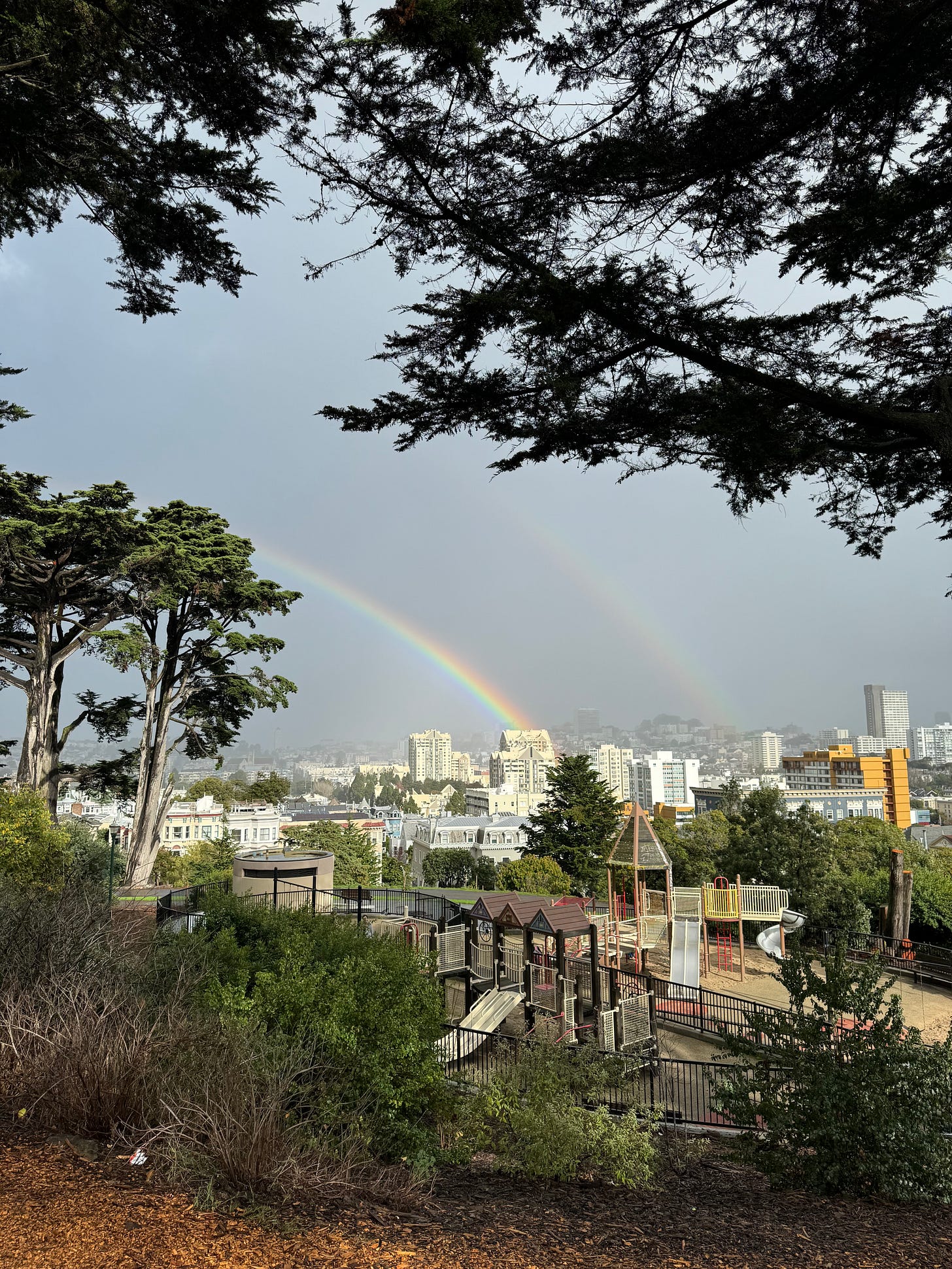This is where I share 3 things every week with my friends and anyone else interested.
—
A picture from my life:
Double rainbow!
A thing on my mind:
I was watching a YouTuber talk about the movie Past Lives and it really stuck with me. He showed a clip of Nora telling her husband Arthur that she feels so “not Korean” when she’s with her childhood sweetheart Haesung, but also “in some way, more Korean?” Later in the scene, Nora says how she has “Korean American friends” but Haesung is “Korean Korean.” But my question is, “what about Nora? How does she identify?”
I moved to the U.S. when I was 11, around the same time as Nora. At the time, all I wanted was to fit in. I picked up the language, the culture, and made friends with kids of all colors until I blended right in. When I got older and we started using labels to describe ourselves (probably around college?), I labeled myself Taiwanese American, or just Asian American. That seems to be the label that lets me fit into American society while feeling like I belong to a smaller tribe at the same time.
The Asian American label feels true most of the time. I’ve even written extensively about it. I get the Asian American experience of feeling like a foreigner in both America AND Asia. I get why a mediocre movie like Crazy Rich Asians had to be a big deal. I get Linsanity. I get #StopAsianHate. I get it.
But I also don’t get it. At a recent dinner for Asian Americans to talk about our relationships with our family, I felt very different from the other participants. I don’t get the sadness of not speaking your parents’ language fluently. I don’t get the pressure to achieve in order to be loved. I don’t get the feeling of abandonment of being raised by grandparents because parents were busy. I don’t get the guilt from the parents’ sacrifice to be in this country. I mean I get it but I don’t, or at least I was looking for something else to be shared with the group that is a big part of who I am. I found it in Past Lives.
Is Nora “Korean American” or “Korean Korean”? She’s both and something else at the same time. This is the quote that hit me from the YouTube essay:
There’s a unique emotional displacement that happens to people who migrated when they were old enough to have forged memories of life in their homeland but still young enough to be remolded by a new environment. As the years mount, and you become someone else somewhere else, that previous existence, now so distant from your current reality, begins to fade into a corner of your subconscious covered in the cobwebs of nostalgia.
- Carlos Aquilar, The Wrap
Nora’s something else because she remembers being Korean Korean and was old enough to have imagined a life as a Korean Korean, and then she moved and consciously became “someone else somewhere else” while her previous Korean existence is still there, tucked away and “covered in the cobwebs of nostalgia.” Nora lives on in her new timeline, carrying this previous part of her that she thinks about but rarely talks about. It comes up sometimes, like when her husband Arthur tells her that she dreams in Korean and how that makes him feel like there’s this part of her that he can never understand. Not because of the language barrier, but because that part of Nora is Na-Young (her Korean name). It comes up when she talks to and eventually reunites with Haesung, but Haesung is just a bridge to the memory of when she was Na-Young. Nora meeting Haesung reminds me of my visits to Taiwan. Everything is familiar — the sights, the sounds, the smells, the food of course, the warmth of the people. But I no longer go by the name I had growing up. I visit as “Ricky” and my Mandarin now has a slight American accent that gives me away sometimes. My “past life” lives on only in my memory and in the person I am today. That’s the nostalgia, but it doesn’t have to be the wistful kind. It just is what it is, and it can even be sweet.
A piece of content I recommend:
Yeah I wrote about it so of course I recommend it. I saw it in theaters and thought it was great, but wasn’t thinking this hard about it until I started watching the YouTube essays about it and the cast interviews.
Bonus: Nostalgia, Ultra by Frank Ocean
Every year or so I’d revisit Nostalgia, Ultra and listen to the whole album. I’d do it more often if it wasn’t so difficult since it’s not on any streaming service. It was Frank Ocean’s first mixtape and I remember loving it so much that I was kicking myself for turning down my friend Sean’s invitation to go all the way to San Francisco to see him perform at a small venue. Frank Ocean blew up afterwards so I’ll probably never be able to see him perform on a small stage.
Bonus Bonus: Flow Club 2023 Thank You Video
I woke up the morning of January 1, 2024 to this surprise thank you video from the Flow Club community. It was the best way to start the new year, and I wanted to share that joy with you all. Happy New Year y’all!
🤗
—
As always, you can find out what I’m thinking in more real-time on Twitter and my essays are on my website. My primary focus (and where I focus) is on Flow Club.







Thank you Ricky- and happy New Year!
watched Past Lives too. not quite my cup of tea, but did think of you. have a great new year.